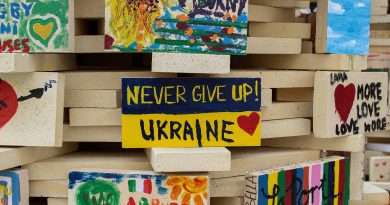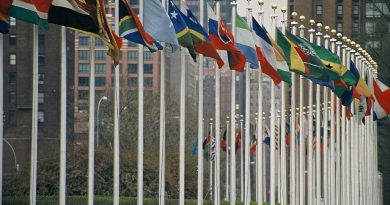SHU Introduces Course on Religious Diplomacy
Adv. Linda Adebola
Staff Writer
Just prior to the start of Russian war on Ukraine, Seton Hall University’s School of Diplomacy and International Relations introduced a new course titled Religion, Race, and International Relations (DIPL6350), bringing the questions of the soon-to-develop conflict to the forefront.
The Russian invasion of Ukraine has put religion at the forefront of the war. This is especially true considering Ukraine’s split from the Russian orthodox church eight years ago, which 70 percent of the Ukrainian population belongs. Since the rule of Prince Volodymyr I of Kyiv in 988, religion has played a significant role in the political history between Ukraine and Russia. This is evident in the current religious demographics of Ukraine, which boast 80 percent of Ukrainians affiliated with an Orthodox denomination, 10 percent belonging to the Ukrainian Greek Catholic Church, one percent Muslim, of which a majority are of Crimean Tatar Heritage, and around 20,000 protestant groups.
The religion’s role in the Russo-Ukrainian war is amplified by Putin’s claim that Ukraine is an inalienable part of Russian history, culture, and spiritual space. Most Ukrainians contend this claim ignores Ukraine’s long history of independence, which is a fundamental part of their national identity. Most pertinent to the religious debate is the prohibition of attacks on religious sites by international law, resulting in many civilians taking up shelter in churches. At least 183 spiritual sites have been severely damaged by Russian forces in at least six regions of Ukraine: Chernihiv, Donetsk, Kharkiv, Kyiv, Luhansk, and Zhytomyr. The response by Ukrainian theologians is an increasing development of a “theology of war” and a “theology of peace,” rather than debating whether a given war is just.
Religion, Race, and International Relations, a graduate level course, tackles this running debate alongside other prevalent issues involving the intersection of these three titular topics. As part of the course, taught in the Spring 2022 semester by Rev. Brian Muzas, students were privileged to experience a guest speaker series. The course was divided into two sections: The first part featured distinguished guests from the U.S.-Pakistan Interreligious Coalition (UPIC), Dr. Junaid Ahmad and Rev. Robert Chase, while the second part hosted Caritas Internationalis’ Joe Donnelly and Brianna Fitzpatrick.
Dr. Ahmad explained that UPIC, a religious and intercultural coalition that serves as part of the School of Diplomacy and International Relations, aims to shatter harmful stereotypes with an agenda working towards transformational change in both societies. In his guest lecture he said, “It is an interfaith movement striving for peace against war post 9/11 backlash upon Muslims in the US, UPIC is essentially a civil society organization and a grassroots movement that addresses the religious divide.”
Rev. Chase explained the role that morals and ethics in faith play in politics. He imparted the lessons learned in religious diplomacy and advised students to “Listen instead of telling what to do, be genuine, create intersection, honor the other, think the best first about the other person, expect the unexpected, treat potentially violent situations with tenderness.”
As explained in the syllabus, this course offers the “students the opportunity to explore the causes of the nature and consequences of the key issues that hinge on the interplay between religion and race in history at both the practical and theoretical levels.” The course “deeply discusses the intersection of religion, race, and international relations throughout history by providing guiding questions that help students answer questions such as what is the best way to live? What is the relationship between religion and society? Whether religion is a strictly private matter and how it affects the way we live together in society?”
This course promises its future students a deep dive into the scholastic interplay between religion, race, and international relations to prepare students to be policy game changers of the future generation.



